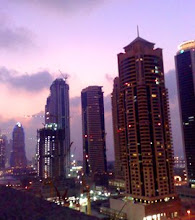Wednesday, May 14, 2008
Economists eye up the ladies
US pundits are now trying to track lipstick sales to see if there are any pointers on consumer confidence. Short skirts are also taken as evidence the economy is doing well; the longer the skirt, the worse the market.
Well it beats looking at investment flows, exchange rates and the price of imported rice.
Wednesday, May 7, 2008
Abu Dhabi sets sights on worldly reputation
Tuesday, May 6, 2008
Timeshare: nice idea, tough sell
 Timeshare looks to be on its way to the
Timeshare looks to be on its way to the Monday, May 5, 2008
The sky is not the limit

Sunday, May 4, 2008
Cigarette City goes up in smoke
First a ban on smoking in public places, next a hike on the cost of a packet of cigarettes: the UAE is in danger of losing its reputation as a smoker’s paradise.
Just a year ago the idea that smokers would be restricted on where they sparked up, or that they would have to pay more than giveaway prices would have been unthinkable. Now that double whammy is on the cards. A new federal anti-smoking law is expected to be passed at the end of the month, with a public smoking ban in place across the emirates by June.
Smoking is accepted to be a ‘bad thing’, but, a hard habit to break, price rises can be seen as less of a deterrent and more of a straight tax on addicts. It will be interesting to hear what the government plans to do with this extra revenue.
Thursday, May 1, 2008
'Good' Gulf money flies to the rescue
While regulators threaten to tighten the criteria for sovereign wealth funds investing in European assets, pissing off Gulf funds in the process, private business is doing what it does best: privately going about its business. Business-class airline Silverjet has found a
European politicians are concerned about Gulf funds’ motives. European businessmen don’t seem to mind, particularly if the money helps an innovative new business through a tricky stage of its development. In a tough airline market, Silverjet, the last-remaining business-only airline following the recent collapses of Eos and Maxjet, flies from
Wednesday, April 30, 2008
Dubai arrives at its cultural crossroads


